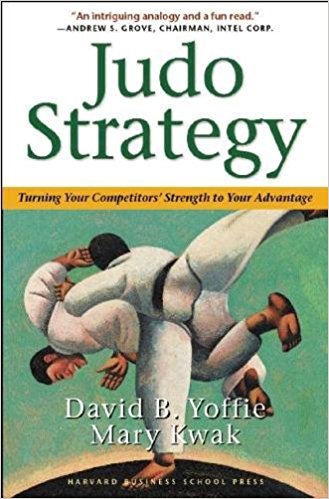Editorial Reviews
Amazon.com Review
Judo, often translated as “the way of gentleness,” is a century-old martial art that employs quickness and agility to help devotees overcome adversaries who seem–at least on the surface–to be more powerful. In Judo Strategy, David B. Yoffie, a professor of International Business Administration at Harvard Business School, and Mary Kwak, a Harvard research associate, turn these principles around for a corporate audience, showing how they can also be used to help companies battle bigger and stronger competitors. The metaphor has been used before in business and economic examples, the authors concede, “yet no one, to our knowledge, had tried to use judo as the basis for a systematic way of thinking about strategy.” In the pages that follow, they begin by delving into the three primary tenets of the discipline (movement, balance, and leverage), and show specifically how each could be applied in business. They then explore the way three prominent New Economy companies (Palm Computing, RealNetworks, and CNET Networks) have successfully put the strategy into practice. Finally, they offer insight into fending off others who employ the judo strategy. In all, an original and practical management approach. —Howard Rothman
Review
“…Mr. Yoffie and Ms. Kwak use the judo metaphor with perfect sensibility.” — Dallas Morning News
“…when taken to the mat, the book stands the test.” — Entrepreneur Magazine
“Judo Strategy is a lively, detailed analysis of how small companies can compete against larger ones.” — Business Week
“Yoffie and Kwak successfully follow through on a simple approach that delivers useful advice for any manager.” — Computerworld
From the Back Cover
“Yoffie and Kwak convincingly portray the rough-and-tumble world of competitive markets as a coherent, judo-like struggle for dominance. They chronicle numerous success stories and failures in the new and old economy. This book is a must-read for executives searching for a strategic path to victory and for those who want to hold on to what they already have.”
-Joel Klein, Chairman and CEO, Bertelsmann, Inc.
“An intriguing analogy and a fun read.”
-Andrew S. Grove, Chairman, Intel Corp.
“Judo Strategy will be the new handbook for managers in many industries. The message is clear and powerful: Smart managers need to learn how to pick battles they can win and avoid head-to-head confrontations they are likely to lose. Yoffie and Kwak show how to do this with a wealth of examples that are simply amazing.”
-Michael A. Cusumano, Professor and Chairman, MIT Sloan Management Review, and Coauthor, Microsoft Secrets
“Yoffie and Kwak develop the judo metaphor for business strategy in an effective and easy-to-read manner. This book is essential reading for beginners competing against formidably entrenched organizations and for established companies vulnerable to attack. Readers quickly learn how judo strategy, including the principles of movement, balance, and leverage, and judo economics can lead an entrant to a significant market position. Anyone wanting to be the bullfighter rather than the bull will love this book.”
-George M.C. Fisher, former Chairman and CEO, Kodak and Motorola
“Judo Strategy describes, in an insightful and entertaining way, how to compete against established competitors. All entrepreneurs and venture capitalists can learn invaluable lessons about how their start-up can turn the natural advantages of a big company against the company itself.”
-Russ Siegelman, General Partner, Kleiner Perkins Caulfield & Byers
“For those who want to understand business strategy in the Internet Age, this book is a must-read. For those who need to compete in the New Economy, this book is a godsend. For those who enjoy great metaphors, deep analysis, and terrific stories, this book is a treat.”
-Reed Hundt, Former Chairman of the Federal Communications Commission, and Author, You Say You Want A Revolution: A Story of Information Age Politics
“In a world where advantage increasingly depends upon movement rather than position, Judo Strategy drills home the ultimate principle of strategy: maximize impact while minimizing effort. This is easy to say but difficult to accomplish. The authors provide pragmatic techniques and examples to help make this principle come alive. Don’t enter the market without this book.”
John Hagel, Author, Net Gain and Net Worth, and Chief Strategy Officer, 12 Entrepreneuring, Inc.


